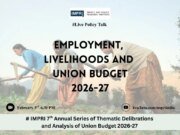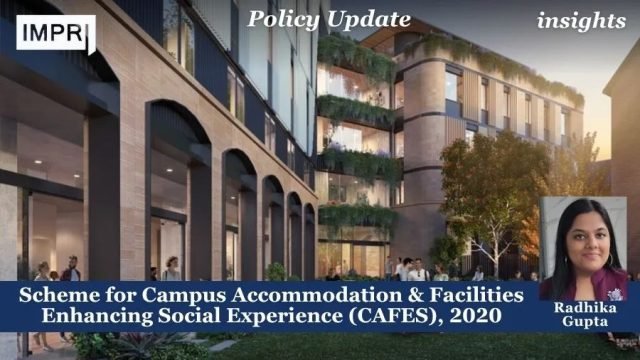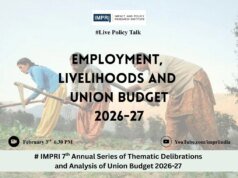Policy Update
Radhika Gupta
Background
Many university-level students in India, especially those from under-privileged backgrounds, were forced to drop-out of their colleges or face the burden of domestic responsibilities due to lack of accommodation facilities on their campus. To address this issue, the Scheme for Campus Accommodation & Facilities Enhancing Social Experience (CAFES) was started by the All India Council for Technical Education (AICTE) and the Department of Higher Education in 2020.
It aimed to support the construction or extension of hostels, to ensure that students have a suitable living space that promotes academic growth and personal development. This scheme caters to Scheduled Castes (SC)/ Scheduled Tribes (ST), differently-abled and North-Eastern Region (NER) students, enabling them to pursue education without the burden of domestic responsibilities.
Functioning
Under the CAFES scheme, Government/ Government-aided engineering colleges/ University departments/ Polytechnics that have been in existence for at least five years are eligible to receive financial aid for the construction of hostels and related facilities like gyms, sports clubs, and libraries inside the campus premises. They can apply under any one of the three categories of this scheme :
(i) CAFES (SC/ST students) – To qualify under this category, the college must have at least 200 SC/ST students on roll.
(ii) CAFÉS (NER) – To qualify under this category, the college must have at least 60 students from the North-Eastern Region on roll.
(iii) CAFES (Differently abled students) – To qualify under this category, the college must have at least 150 differently abled students on roll.
The CAFES scheme also supports the extension of existing hostels in the institute by funding additional construction work to benefit the students in need.
For the construction of the hotels, AICTE has stated a total funding limit for each college, which is ₹3.25 Crore. This includes:
(a) Construction of Hostel – ₹3 Crore
(b) Establishment of Gym equipment – ₹5 Lakh
(c) Establishment of Indoor sports club – ₹10 Lakh
(d) Establishment of a library for the preparation of tests for competitive examinations/higher education – ₹10 Lakh
The overall objective of the scheme is to facilitate the continuation of education, reduce student dropout rates, and allow interaction beyond class hours for their holistic development.
Implementation
Under the CAFES scheme, the funding for the construction or expansion of hostels is given in three installments. The 1st installment includes the disbursement of 50% of the total funds, provided before the construction and upon sanctioning the institute’s proposal. The 2nd installment includes the disbursement of 40% of the sanctioned amount for hostel construction, which is given only after a spot inspection by two AICTE engineers. The remaining 10% of the amount is provided under the 3rd installment after the documentation process is completed by the institute.
However, according to the stated rules, the 1st installment must be returned (along with interest) if construction of the hostel doesn’t start even after six months of receiving the sanctioned amount. The institutes are given a period of three years to complete the construction.
Therefore, according to the latest data released by the government, the status of different projects under the CAFES scheme is as follows:
| Sno | Status of the project | Number |
| 1 | Institutes that have received all instalments and completed/settled hostels | 55 |
| 2 | Institutes that refunded 1st instalment along with interest | 15 |
| 3 | Institutes that have received 1st instalment, released/ hostel under construction | 13 |
| 4 | Institutes received the 2nd instalment, released/hostel is under construction | 32 |
| Total | 115 |
Impact and Challenges
The CAFES scheme has helped more than fifty institutes build, renovate, or expand their hostels by providing them with the required funds. This has helped students from diverse backgrounds to be given accommodation inside their college campuses, freeing them from the burden of domestic responsibilities in the process, giving them time to focus on academics and personal development, as well as allowing them to interact with other students outside the classroom.
However, there are certain challenges associated with the implementation of the CAFES scheme including :
- One of the most prominent issue is that institutes from Punjab, Haryana, Arunachal Pradesh, Meghalaya, Mizoram, Nagaland & Union Territories are excluded from the SC/ST component of the scheme. These states also have significant student populations from SC and ST categories who require infrastructural support, yet are denied so under the CAFES scheme.
- Delays in fund disbursement due to the lengthy process of approval have also led to incomplete constructions of hostels in the past.
- Even in the hostels constructed under this scheme, students have complained that basic facilities like clean water, sanitation, free Wi-Fi, etc., have not been provided to them, causing problems.
Way Forward
The Scheme for Campus Accommodation & Facilities Enhancing Social Experience (CAFES), started in 2020 by AICTE and the Department of Higher Education, has helped ensure that college-going students aren’t forced to drop out due to a lack of accommodation. However, there have been some challenges in the implementation of the scheme, like unequal access to funding, poor quality of facilities provided in the hostels built, etc. Therefore, the following is a list of suggestions that can be implemented to ensure a positive impact under the CAFES scheme:
- Include institutes from Punjab, Haryana, Arunachal Pradesh, Meghalaya, Mizoram, Nagaland & Union Territories in the SC/ST component of the scheme.
- Simplify the fund-sanctioning process for institutes by using the latest digital technologies.
- Provide a flexible grace period to institutes for the construction of hostels, as delays are often caused due to monsoons, inadequate or delayed funds, and other such issues.
- Make the funding provisions more accessible for institutes in semi-urban areas as well to ensure equitable development of hostel facilities.
- Defining and establishing minimum quality regulations in all hostels built under the CAFES scheme. These standards can include facilities like availability of clean water, sanitation, Wi-Fi, healthy food options in the mess, among other such necessities.
- Encourage eco-friendly construction practices like the use of green-building materials, installing solar panels, using water collected through rainwater harvesting systems, etc.
- AICTE can create a real-time impact monitoring dashboard that shares the number of hostels built, total applications as well publish annual reports about the facilities provided in the constructed hostels, to ensure transparency and encourage public awareness about the scheme.
References
About the contributor: Radhika Gupta is a research intern at IMPRI. She is currently pursuing her graduation in journalism and mass communication from Bennett University.
Acknowledgement: The author extends her sincere gratitude to Aasthaba Jadeja and fellow interns, who provided guidance throughout the process.
Disclaimer: All views expressed in the article belong solely to the author and not necessarily to the organisation.
Read more at IMPRI:
Bridging the Cognitive Divide: Adaptive Assistive Systems for the Neurologically Challenged



















